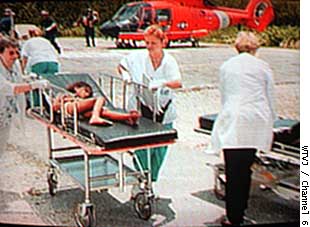Published Friday, May 16, 1997, in the Miami Herald
Rafters stranded on isle; 3 dead after 2-week ordeal
By CYNTHIA CORZO
and MARIA MORALES
Herald Staff Writers
| Hoping to reach Florida and freedom, 14 Cuban rafters instead became marooned for two
weeks without food or water on a tiny rock island in the Bahamas. Two children and a man
died before the group was rescued Thursday afternoon, rafters said, and two others who
left on a raft to seek help are missing. Hoping to reach Florida and freedom, 14 Cuban
rafters instead became marooned for two weeks without food or water on a tiny rock island
in the Bahamas. Two children and a man died before the group was rescued Thursday
afternoon, rafters said, and two others who left on a raft to seek help are missing. |

DEHYDRATED:Rescue workers bring in one of the children from the
island to a hospital in Marathon. |
The Coast Guard, following a tip from Brothers to the Rescue, found five
adults and four children who had survived on raw slugs, birds they could catch, and
rainwater. The three dead, whose names were not available, were buried in shallow graves.
The Coast Guard was searching for the two missing rafters Thursday night, Petty Officer
Scott Carr said.
The group was forced to take refuge on a cluster of uninhabited coral
outcroppings named Dog Rocks, about 125 miles south of Miami.
``These days have lasted an eternity. We thought they were lost, that they
were dead,'' said Leonardo Tamayo, whose 13-year-old daughter, Idanis Tamayo, was in the
group. ``Thank God some were alive.''
The rafters told the Coast Guard they left April 29 from Isabela de Sagua,
in the north-central province of Villa Clara, in a 20-foot sailboat. After two days at
sea, they reached Dog Rocks.
``Somehow they ended up on Dog Rocks,'' Carr said. ``We don't know what
happened to their sailboat.''
Six rafters -- three women and three children -- were flown to Fisherman's
Hospital in Marathon, where they were treated for dehydration, cuts and exposure,
according to hospital spokeswoman Lisa Hagy.
The group -- Idanis; her mother, Magaly Rodriguez Molina; Rodriguez's
stepsisters, Patricia Martinez Rodriguez, 8, Maria de Jesus Martinez Rodriguez, 7, and
Camila Martinez Rodriguez, 4; and friend Yuriana Lara Aleman, 21 -- stayed overnight at
the hospital.
``They were severely dehydrated and sunburned,'' Carr said. ``The four
girls were more burned than dehydrated.''
``They are all skins and bones,'' said Rick Shrader, assistant
administrator at Fisherman's Hospital. The group was fed chicken noodle soup, asparagus,
ice cream, milk and eggs, he added.
The women and children were met in Marathon by officials with the U.S.
Border Patrol and the Immigration and Naturalization Service.
Generally, when rafters touch U.S. soil -- whether they reach it on their
own or are airlifted for medical purposes -- they are allowed to stay in the country.
The two men and one woman who did not require hospitalization were taken
to the Coast Guard cutter Dallas, where they will be interviewed by INS officials. They
will determine whether the rafters have valid cases for political asylum.
The Cuban American National Foundation and U.S. Rep. Lincoln Diaz Balart,
R-Miami, wrote Thursday to U.S. Attorney General Janet Reno, INS Commissioner Doris
Meissner and secretary of State Madeleine Albright asking that the refugees not be
repatriated.
The INS did not return calls from The Herald on Thursday.
``They shouldn't be deported,'' said Ana Rodriguez, a cousin of Lara.
``None of them are going to be a public burden. They have relatives here, and we're going
to support them 100 percent.''
In the group was Rodriguez Molina's husband, Rolando Martinez Montoya. He
had a visa to enter the United States with his family, but their departure from the island
had not been authorized by the Cuban government.
Another refugee was Adrian Gutierrez Rojas, who slipped into the Belgian
Embassy in Havana in 1994 and asked for political asylum. With him came his wife, Lizbet
Romero, and their 3-year-old daughter, Adrializ, who is believed to be among the dead.
Gutierrez left the embassy after Cuba guaranteed that he would not suffer
reprisals. But although Belgium granted him an entry visa, Cuba refused him an exit
permit.
As of Thursday evening, the fate of Gutierrez and Romero was unknown. The
Cubans were spotted Thursday morning by pilots from Brothers to the Rescue, a Miami-based
exile group that routinely searches the Florida Straits for rafters. The group had
received a call from worried family members who knew the rafters were en route.
A white sheet had been placed over the three shallow graves of sand.
Through a two-way radio dropped by the plane, survivor Marcel Torres Fonz described the
situation to the pilots.
Family members in Miami found out about the odyssey Sunday, when they
called to wish relatives in Cuba a happy Mother's Day.
``I started to call all the Coast Guard offices and no one knew
anything,'' Rodriguez said. ``They said they hadn't picked anyone up.''
Desperate, Rodriguez called Brothers to the Rescue. The group's volunteer
pilots prepared a special mission and left at 8 a.m. Thursday.
``It was a miracle that we found them,'' Brothers pilot Guillermo Lares
said.
Herald staff writers Marika Lynch and Susana Bellido and the Associated
Press contributed to this report.
Return to Index
